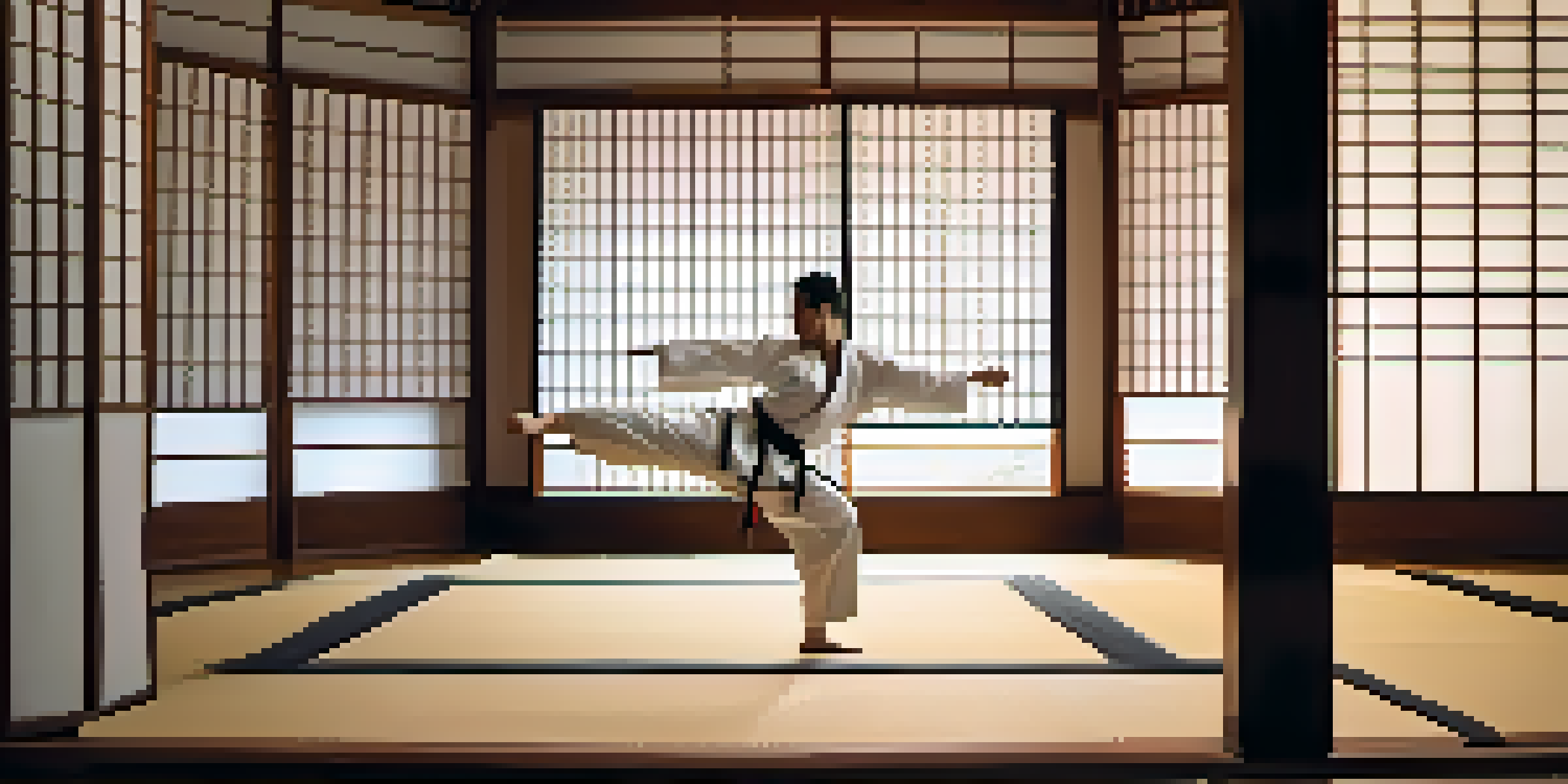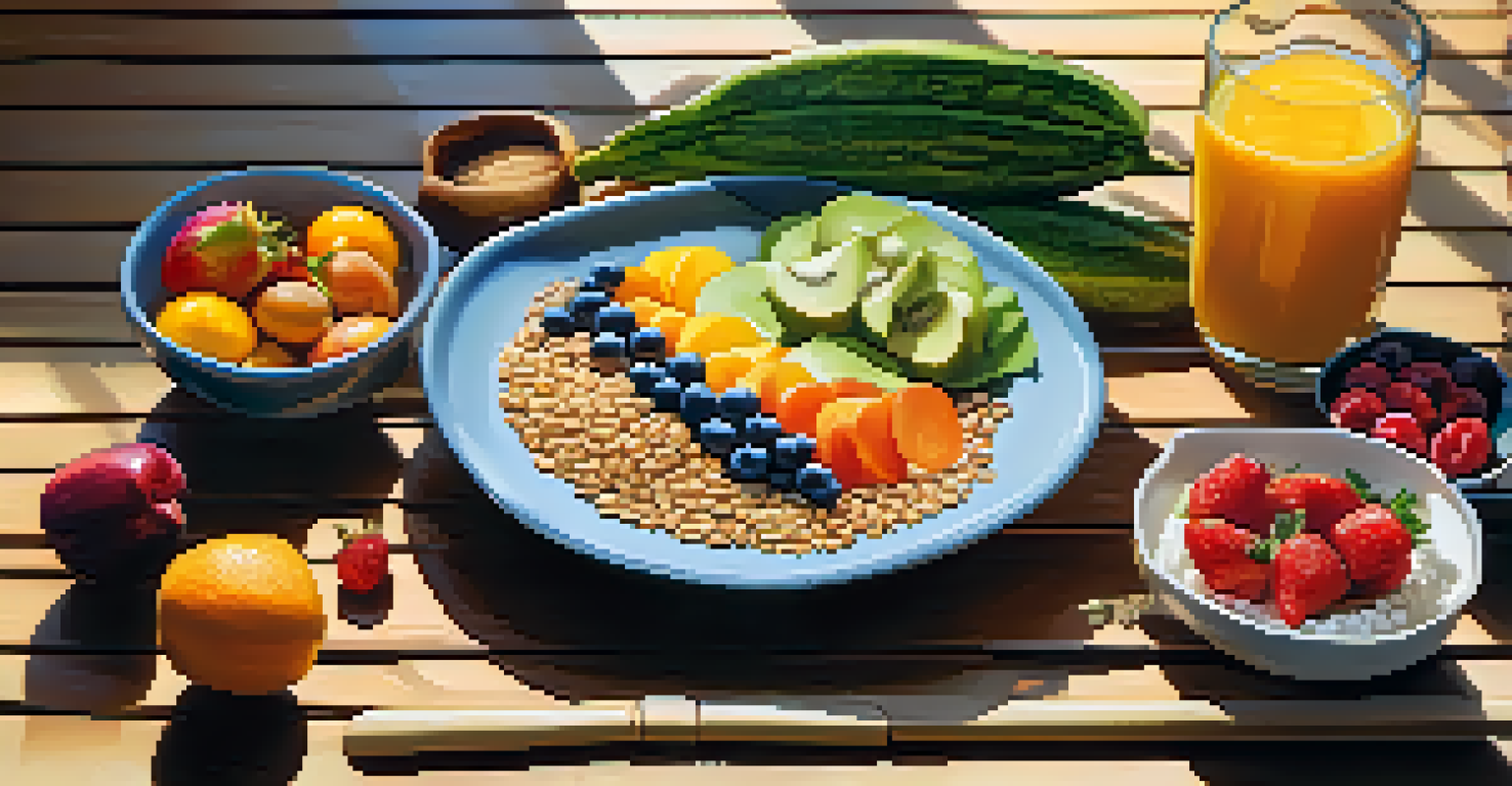Understanding Macronutrients for Optimal Martial Arts Performance

What Are Macronutrients and Why They Matter
Macronutrients are the nutrients we need in large amounts to fuel our bodies, especially during intense physical activities like martial arts. They include carbohydrates, proteins, and fats, each playing a crucial role in energy production and recovery. Understanding how they interact can significantly enhance your performance on the mat.
Let food be thy medicine and medicine be thy food.
For martial artists, the right balance of macronutrients can mean the difference between feeling energized and fatigued. Carbohydrates are primarily your body's main fuel source, especially during high-intensity training. Proteins support muscle repair and growth, while fats provide sustained energy for longer sessions.
By grasping the fundamentals of macronutrients, you can tailor your diet to meet your specific training needs. This knowledge empowers you to make informed choices that enhance your performance, whether you're sparring, competing, or simply honing your skills.
Carbohydrates: The Primary Fuel Source
Carbohydrates are often dubbed the body's primary fuel source, and for good reason. They break down into glucose, which powers your muscles during training sessions and competitions. Think of carbohydrates as the gasoline in your engine, essential for keeping everything running smoothly.

During martial arts, especially in dynamic activities like sparring or drills, your body relies heavily on readily available glucose. Consuming the right type of carbs—such as whole grains, fruits, and vegetables—provides sustained energy and helps prevent fatigue. This means you can train harder and longer without hitting that dreaded wall.
Macronutrients Fuel Performance
Carbohydrates, proteins, and fats each play a crucial role in energy production and recovery for martial artists.
To optimize your performance, aim to include a variety of carbohydrates in your meals. This not only ensures you're fueling your body adequately but also helps with recovery, as replenishing glycogen stores is vital after intense training sessions.
Proteins: Building Blocks for Recovery and Strength
Proteins are crucial for anyone engaged in martial arts, as they are the building blocks of muscle tissue. After rigorous training, your muscles undergo stress and need repair, which is where protein comes in. Think of protein as the construction crew that rebuilds and strengthens your muscles after a tough workout.
You are what you eat, so don't be fast, cheap, easy, or fake.
Incorporating high-quality protein sources, such as lean meats, fish, eggs, and legumes, into your diet can enhance recovery and support muscle growth. Timing is also key; consuming protein shortly after training can maximize muscle repair and encourage growth.
Aim for a balanced intake of protein throughout the day to ensure your body has a steady supply for recovery. This not only aids in muscle repair but can also help improve overall performance, making you more resilient on the mat.
Fats: Essential for Endurance and Hormonal Balance
While carbohydrates and proteins often steal the spotlight, fats are an essential macronutrient that shouldn't be overlooked. Fats provide a concentrated source of energy, particularly during longer training sessions when your body taps into fat stores. Think of fats as the slow-burning fuel that keeps your engine running over time.
In addition to energy, healthy fats play a role in hormone production, which is vital for recovery and muscle growth. Sources like avocados, nuts, seeds, and olive oil not only nourish your body but also contribute to overall health, making them a necessary part of your diet.
Hydration is Key to Success
Staying hydrated is essential for maintaining performance and preventing fatigue during training sessions.
Incorporating healthy fats into your meals can help sustain energy levels and promote a balanced diet. Just remember, moderation is key, as fats are calorie-dense and should complement the other macronutrients for optimal martial arts performance.
Hydration: The Unsung Hero of Performance
Hydration is often an overlooked aspect of nutrition, yet it plays a critical role in martial arts performance. Dehydration can lead to fatigue, decreased coordination, and impaired muscle function, all of which can hinder your training. Think of water as the lubricant that keeps your body running smoothly during intense activities.
To ensure optimal hydration, it's essential to drink water consistently throughout the day, especially before, during, and after your training sessions. Incorporating electrolyte-rich beverages can also be beneficial, particularly when training for extended periods or in hot conditions.
Listening to your body is key; thirst is your body's way of signaling that you need more fluid. By prioritizing hydration, you support your overall performance and recovery, allowing you to train at your best.
Meal Timing: Fueling Performance at the Right Moments
Meal timing can significantly impact your martial arts performance, especially when it comes to training and competition. Eating the right foods at the right times ensures your body has the energy it needs to perform optimally. Imagine your meals as strategic pit stops that fuel your journey on the mat.
Before training, aim for a meal rich in carbohydrates and moderate in protein to maximize energy levels. After training, focus on protein and carbohydrates to replenish glycogen stores and rebuild muscle. This approach not only enhances performance but also aids recovery.
Timing Your Meals Matters
Strategically timing your meals can optimize energy levels and enhance recovery in martial arts training.
Planning your meals around your training schedule can help you maintain energy levels and improve your overall performance. By being mindful of when you eat, you're setting yourself up for success on the mat.
Supplementation: Enhancing Your Nutritional Strategy
While a well-rounded diet should be your primary source of nutrients, supplementation can play a valuable role in enhancing performance. Supplements like protein powders, branched-chain amino acids (BCAAs), and creatine can provide additional support when needed. Think of supplements as a boost to your already solid nutritional foundation.
However, it's essential to approach supplementation with caution. Always consult with a healthcare professional or a registered dietitian before adding any new products to your routine. This ensures you're making informed choices that align with your individual needs and goals.

Remember, supplements should complement, not replace, a balanced diet. By integrating them wisely, you can optimize your martial arts performance and recovery.
Putting It All Together: A Balanced Approach
Understanding macronutrients is just the first step in optimizing your martial arts performance. The key is to find a balance that works for you, considering your training intensity, goals, and individual preferences. Picture your nutrition as a well-tuned machine, with each macronutrient playing a vital role in its smooth operation.
Experimenting with different foods, meal timings, and hydration strategies can help you discover what fuels your body best. Keep track of how different approaches affect your performance to fine-tune your nutrition plan over time.
Macronutrients Fuel Performance
Understanding the balance of carbohydrates, proteins, and fats is crucial for enhancing energy, recovery, and overall performance in martial arts.
Ultimately, the right approach to macronutrients can enhance your martial arts training, improve recovery, and help you achieve your goals. With the right knowledge and strategies in place, you're well on your way to excelling on the mat.